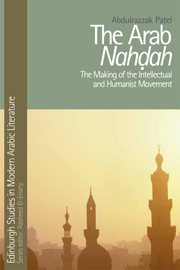Book contents
- Frontmatter
- Contents
- Series Editor's Foreword
- Acknowledgements
- Preface
- Introduction: Perspectives, Paradigms and Parameters
- 1 Contemporary Interpretations of the Nahḍah: Tradition, Modernity and the Arab Intellectual
- 2 The Reintegration of Pre-modern Christians into the Mainstream of Arabic Literature and the Creation of an Inter-religious Cultural Space
- 3 Guardians of the Pre-modern Arab-Islamic Humanist Tradition: Legends without a Legacy, a Tradition without Heirs
- 4 Language Reform and Controversy: The al-Shartūnīs Respond in Defence of the Pre-modern Humanist Tradition
- 5 Arabism, Patriotism and Ottomanism as Means to Reform
- 6 Arab Intellectuals and the West: Borrowing for the Sake of Progress
- 7 Education, Reform and Enlightened Azharīs
- 8 Enacting Reform: Local Agents, Statesmen, Missionaries and the Evolution of a Cultural Infrastructure
- Conclusion
- Bibliography
- Index
Introduction: Perspectives, Paradigms and Parameters
Published online by Cambridge University Press: 05 October 2013
- Frontmatter
- Contents
- Series Editor's Foreword
- Acknowledgements
- Preface
- Introduction: Perspectives, Paradigms and Parameters
- 1 Contemporary Interpretations of the Nahḍah: Tradition, Modernity and the Arab Intellectual
- 2 The Reintegration of Pre-modern Christians into the Mainstream of Arabic Literature and the Creation of an Inter-religious Cultural Space
- 3 Guardians of the Pre-modern Arab-Islamic Humanist Tradition: Legends without a Legacy, a Tradition without Heirs
- 4 Language Reform and Controversy: The al-Shartūnīs Respond in Defence of the Pre-modern Humanist Tradition
- 5 Arabism, Patriotism and Ottomanism as Means to Reform
- 6 Arab Intellectuals and the West: Borrowing for the Sake of Progress
- 7 Education, Reform and Enlightened Azharīs
- 8 Enacting Reform: Local Agents, Statesmen, Missionaries and the Evolution of a Cultural Infrastructure
- Conclusion
- Bibliography
- Index
Summary
This book is an intellectual history dealing with an aspect of Arab-Islamic culture. The first question one must thus raise is with regard to the meaning and nature of intellectual history. What are its main characteristics and central disciplinary concerns? Intellectual history is interdisciplinary in nature and as such intellectual historians do not work on the assumptions of a shared specific method. According to Kelly, primary topics of inquiry include: philosophy, literature, language, art, science and other disciplines, and each has its own tradition of historical inquiry. Intellectual history thus lacks one overriding concern. In terms of hermeneutics it is not really a discipline, but rather a point of view within a discipline, which is history, and the intellectual historian is to ‘explore those areas of the human past in which decipherable traces, usually written or iconographic, have survived, and then to give contemporary meaning to these traces through the medium of language’. Modern Arab-Islamic intellectual history is similarly a multi-disciplinary area of inquiry rather than an autonomous academic discipline, and as such it is not immediately clear with what conceptual tools it is best handled. In fact, traditions and blueprints of practice which suggest ways of proceeding are scarce. Abu-Rabi‘'s observation in 1996 remains true today: ‘methodological studies of modern Arab/Islamic thought are rare, and, in many instances, are only partially adequate’.
- Type
- Chapter
- Information
- The Arab NahdahThe Making of the Intellectual and Humanist Movement, pp. 1 - 11Publisher: Edinburgh University PressPrint publication year: 2013



